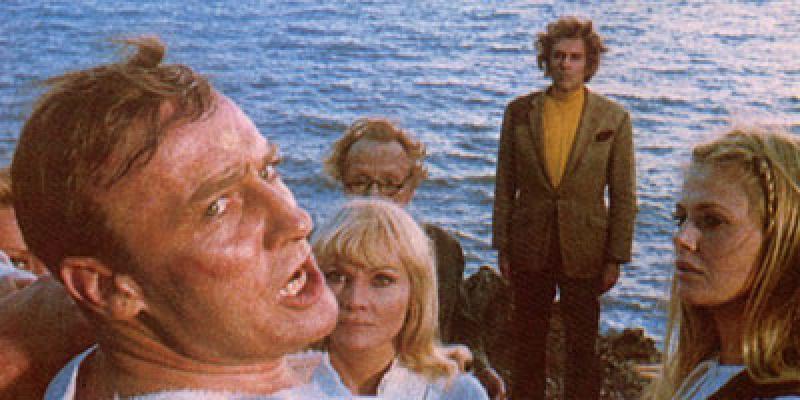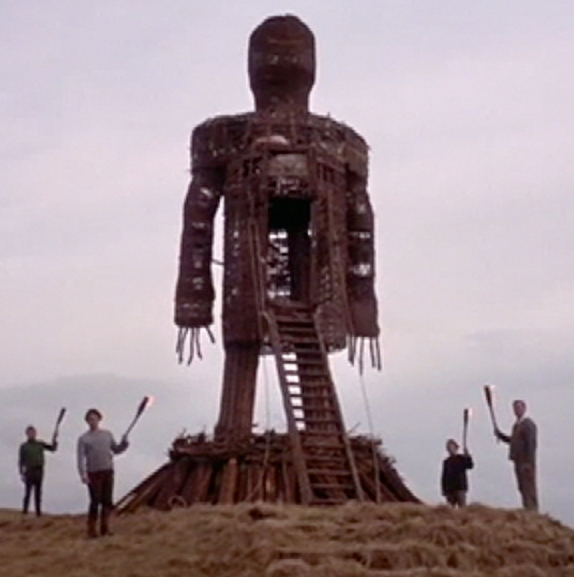The Wicker Man | reviews, news & interviews
The Wicker Man
The Wicker Man
The 'Citizen Kane' of horror movies returns to claim its place in cinema history

Created in a time when we could be shocked, The Wicker Man shows its power by being shocking still. Conceived by its director Robin Hardy, writer Anthony Shaffer and star Christopher Lee as a reaction to New Age-ism, The Wicker Man delights, thrills and horrifies in this latest version, restored to the American theatrical cut.
Bad luck struck The Wicker Man back in 1973, when director Hardy’s debut was caught up, like many films continue to be, in a corporate wrangle. Its release temporarily delayed, the original cut of 102 minutes was edited down to 88, along with a reduction of its marketing and promotion. Released with the now equally memorable Nicolas Roeg feature Don’t Look Now, The Wicker Man was a film that had yet to find its footing.
That seems to have happened 40 years on, with films like Ben Wheatley’s Kill List stirring interest in this potent anomaly. This 40th anniversary re-release of The Wicker Man is not the "final" version or the most complete. It is not the director’s cut or even longest cut. Reports were that the negative vanished from Shepperton Studios' storage and, possibly, ended up as landfill in the M4. Whether the film in its entirety will ever be restored remains to be seen – in fact, there was a campaign by StudioCanal to find its missing constituents that made this version the best possible. Actually, it seems we have Roger Corman to thank for this, even if his print of the full-length version went missing in the 1980s, leaving only a video copy in its stead.
 Enough of the filmic history lesson: The Wicker Man is as arresting and potent to someone who knows nothing of its creation as it is to the aficionado (pagans prepare for human barbecue, pictured right). Although the restoration here is a bit ragged (stock quality varies in certain scenes), this film vividly evokes another time and space. Christopher Lee's balanced yet hip performance as Lord Summerisle is madly appropriate. Diane Cilento is polished perfection as the pagan schoolmarm who is both alluring and smart. The base draw of The Wicker Man is Britt Ekland as the landlord’s daughter whose song and naked dance lies at the film’s palpitating core. The dubbing artistry of Annie Ross is worth watching, as the Scottish singer's voice matches Ekland’s lips quite perfectly. And if it is true that the body-double for the then recently pregnant Ekland was Scottish housewife Jane Jackson, then everyone would move to Scotland immediately.
Enough of the filmic history lesson: The Wicker Man is as arresting and potent to someone who knows nothing of its creation as it is to the aficionado (pagans prepare for human barbecue, pictured right). Although the restoration here is a bit ragged (stock quality varies in certain scenes), this film vividly evokes another time and space. Christopher Lee's balanced yet hip performance as Lord Summerisle is madly appropriate. Diane Cilento is polished perfection as the pagan schoolmarm who is both alluring and smart. The base draw of The Wicker Man is Britt Ekland as the landlord’s daughter whose song and naked dance lies at the film’s palpitating core. The dubbing artistry of Annie Ross is worth watching, as the Scottish singer's voice matches Ekland’s lips quite perfectly. And if it is true that the body-double for the then recently pregnant Ekland was Scottish housewife Jane Jackson, then everyone would move to Scotland immediately.
It is Edward Woodward, looking much younger than his actual 43 years, who glues The Wicker Man together. As Sergeant Howie, a devout, insistent Scottish police officer assigned to investigate an anonymous report of a missing girl on a local island, he arrives at the isolated Scottish location of Summerisle in a swish self-flown pontoon plane. He intends to make short shrift of the case, but his arrival is met with indifference. The residents are offhand about the girl, and can’t quite answer his questions, despite Howie displaying a clear photograph of the girl in question. As the story continues, Howie thinks he is cleverly solving the case when he is actually losing control of it. The capturing on film of this innocent Christian man, sweating and lured by pagan sex magic, is testimony to Woodward’s skill. He never lets Howie slip into comedy or stereotype.
An intelligent and unsettling thriller described as "horror" only because we don’t quite know what to do with it, The Wicker Man’s longevity rests on its splendid script and convincing production design – two of the many solid elements that allowed Hardy to create a film that exists as a lasting kink in the mind of the film world as a whole. Seeing The Wicker Man is an indelible experience.
Add comment
The future of Arts Journalism
You can stop theartsdesk.com closing!
We urgently need financing to survive. Our fundraising drive has thus far raised £49,000 but we need to reach £100,000 or we will be forced to close. Please contribute here: https://gofund.me/c3f6033d
And if you can forward this information to anyone who might assist, we’d be grateful.

Subscribe to theartsdesk.com
Thank you for continuing to read our work on theartsdesk.com. For unlimited access to every article in its entirety, including our archive of more than 15,000 pieces, we're asking for £5 per month or £40 per year. We feel it's a very good deal, and hope you do too.
To take a subscription now simply click here.
And if you're looking for that extra gift for a friend or family member, why not treat them to a theartsdesk.com gift subscription?
more Film
 theartsdesk Q&A: director Kelly Reichardt on 'The Mastermind' and reliving the 1970s
The independent filmmaker discusses her intimate heist movie
theartsdesk Q&A: director Kelly Reichardt on 'The Mastermind' and reliving the 1970s
The independent filmmaker discusses her intimate heist movie
 Blu-ray: Wendy and Lucy
Down-and-out in rural Oregon: Kelly Reichardt's third feature packs a huge punch
Blu-ray: Wendy and Lucy
Down-and-out in rural Oregon: Kelly Reichardt's third feature packs a huge punch
 The Mastermind review - another slim but nourishing slice of Americana from Kelly Reichardt
Josh O'Connor is perfect casting as a cocky middle-class American adrift in the 1970s
The Mastermind review - another slim but nourishing slice of Americana from Kelly Reichardt
Josh O'Connor is perfect casting as a cocky middle-class American adrift in the 1970s
 Springsteen: Deliver Me From Nowhere review - the story of the Boss who isn't boss of his own head
A brooding trip on the Bruce Springsteen highway of hard knocks
Springsteen: Deliver Me From Nowhere review - the story of the Boss who isn't boss of his own head
A brooding trip on the Bruce Springsteen highway of hard knocks
 The Perfect Neighbor, Netflix review - Florida found-footage documentary is a harrowing watch
Sundance winner chronicles a death that should have been prevented
The Perfect Neighbor, Netflix review - Florida found-footage documentary is a harrowing watch
Sundance winner chronicles a death that should have been prevented
 Blu-ray: Le Quai des Brumes
Love twinkles in the gloom of Marcel Carné’s fogbound French poetic realist classic
Blu-ray: Le Quai des Brumes
Love twinkles in the gloom of Marcel Carné’s fogbound French poetic realist classic
 Frankenstein review - the Prometheus of the charnel house
Guillermo del Toro is fitfully inspired, but often lost in long-held ambitions
Frankenstein review - the Prometheus of the charnel house
Guillermo del Toro is fitfully inspired, but often lost in long-held ambitions
 London Film Festival 2025 - a Korean masterclass in black comedy and a Camus classic effectively realised
New films from Park Chan-wook, Gianfranco Rosi, François Ozon, Ildikó Enyedi and more
London Film Festival 2025 - a Korean masterclass in black comedy and a Camus classic effectively realised
New films from Park Chan-wook, Gianfranco Rosi, François Ozon, Ildikó Enyedi and more
 After the Hunt review - muddled #MeToo provocation
Julia Roberts excels despite misfiring drama
After the Hunt review - muddled #MeToo provocation
Julia Roberts excels despite misfiring drama
 London Film Festival 2025 - Bradley Cooper channels John Bishop, the Boss goes to Nebraska, and a French pandemic
... not to mention Kristen Stewart's directing debut and a punchy prison drama
London Film Festival 2025 - Bradley Cooper channels John Bishop, the Boss goes to Nebraska, and a French pandemic
... not to mention Kristen Stewart's directing debut and a punchy prison drama
 Ballad of a Small Player review - Colin Farrell's all in as a gambler down on his luck
Conclave director Edward Berger swaps the Vatican for Asia's sin city
Ballad of a Small Player review - Colin Farrell's all in as a gambler down on his luck
Conclave director Edward Berger swaps the Vatican for Asia's sin city
 London Film Festival 2025 - from paranoia in Brazil and Iran, to light relief in New York and Tuscany
'Jay Kelly' disappoints, 'It Was Just an Accident' doesn't
London Film Festival 2025 - from paranoia in Brazil and Iran, to light relief in New York and Tuscany
'Jay Kelly' disappoints, 'It Was Just an Accident' doesn't

Comments
How can you manage to review
Agreed,re your last